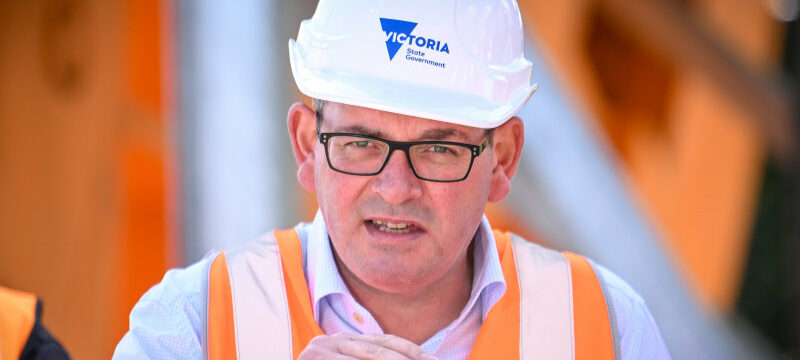Save articles for later
Add articles to your saved list and come back to them any time.
Watching Premier Daniel Andrews respond to a corruption probe, you’d be forgiven for wondering what all the fuss was about.
Andrews’ unrivalled ability to use words to twist a narrative to his favour is what makes him such an effective politician, and that skill was on full display on Wednesday.
Premier Daniel Andrews on Wednesday said IBAC’s “educational” report found no evidence of corruption against his government.Credit: Eddie Jim
Addressing the media just 90 minutes after the release of the anti-corruption probe – which found the government improperly awarded a lucrative training contract to a union to deliver an inadequate safety training program to health workers – Andrews was banking on the fact that few Victorians would have read the 130-page report. He knew his reaction would be his only chance to defuse the public’s concerns.
His primary goal was to bypass the media and speak to those unfortunate souls watching. His message was simple: “There are no findings against anyone in this report.”
While Andrews is correct to say the report by the Independent Broad-based Anti-corruption Commission found no findings of corrupt conduct, it is replete with findings of unethical behaviour, misconduct and misbehaviour.
All the 17 recommendations in the report, whether relating to public servants, ministerial advisers or cabinet ministers, were made because there were adverse findings about these people’s behaviour.
Investigators found the health department awarded a contract to a union without a tender process, ministerial advisers had improper influence over the process, and public servants were scared to offer frank advice.
The report – which is the result of a three-year investigation – found multiple occasions when public servants “did not make impartial, frank and fearless decisions” because they feared missing out on opportunities, or at worst being “given your marching orders” as one witness put it.
Asked whether he acknowledged this had occurred, Andrews didn’t express shock or concern. Instead, he told reporters, “That’s not my experience.”
Meanwhile, he repeatedly asserted the watchdog’s findings were based on the “opinions” of investigators, rather than evidence, and dismissed IBAC’s final report as an “educational” document, as if it were a pamphlet on seasonal flu you’d get in a doctor’s office.
But in suggesting the report and its conclusions weren’t significant, and that the key takeaway was “there were no findings against anyone”, Andrews ignores one important point.
Under Victorian law, the anti-corruption body is prohibited from concluding that a person has committed a criminal offence. Instead, it makes findings of fact about conduct using the civil standard of proof – the balance of probabilities.
Whether action will be taken about these alarming findings is up to Andrews. He won’t be forced into acting on all 17 recommendations.
IBAC has asked the government to update the parliament on any response by the end of October. But the premier’s early dismissal of the report as a “narrative” or “commentary” suggests little action will be taken.
In fact, in his press conference Andrews questioned why there was the need for an investigation at all, insisting the contract matter hadn’t even met the threshold to trigger a corruption probe. It did.
Once the investigation was under way, IBAC heard evidence of the growing influence of ministerial advisers and the centralisation of power within the premier’s private office.
The last point – about the power of Andrews’ office – wasn’t made by a journalist but by two former cabinet ministers, Jill Hennessy and Jenny Mikakos – who served alongside Andrews in cabinet.
Hennessy – herself a former ministerial staffer – told IBAC there had been a “significant expansion” in the premier’s private office since she entered the Victorian parliament in 2010. She said this expansion had led to a “centralisation of decision-making and media management” which promoted short-term policy development.
Mikakos echoed these concerns describing Andrews’ office as having “its tentacles everywhere” and citing an example where the premier’s staff sat in on her phone conversations.
Mikakos suggested the Westminster tradition of ministerial responsibility – where ministers are answerable to the parliament – is apparently meaningless in Victoria as ministers are directed by the premier’s office about how to manage their departments.
Asked to respond to these concerns from his former colleagues, Andrews resorted to his long-standing tradition of not naming critics, instead referring to them as “those two people”.
“Those concerns have never been raised with me … but they are in the report, that might be their view,” he added.
A view, perhaps, but it was part of evidence which was given under oath.
The premier may be comfortable that an erosion of Westminster traditions and the centralisation of power in his office isn’t going to lose him any votes. Perhaps that’s why he didn’t feel the need to say sorry for the failings of ministers, staff and public servants on his watch.
But there were victims here. Those frontline healthcare workers who received inadequate training in the face of increasing violence at hospitals.
Surely, they deserve better than the premier’s attempts to dismiss the misbehaviour and improper conduct identified in the anti-corruption commission’s comprehensive report. They deserve an apology.
Annika Smethurst is The Age’s state political reporter.
The Opinion newsletter is a weekly wrap of views that will challenge, champion and inform your own. Sign up here.
Most Viewed in Politics
From our partners
Source: Read Full Article

